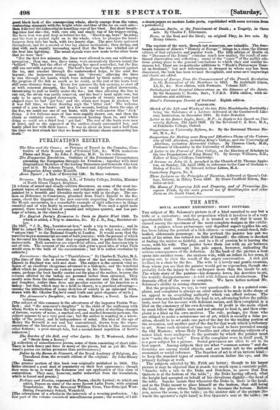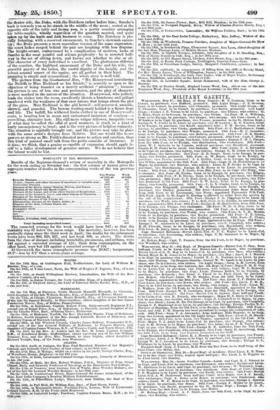THE ARTS.
ACJIMENY EXHIBITION : STORY PICTURES.
Tax subject of Mr. Solomon's picture is of a kind unsuited to any but a trifle or a caricature ; and the proposition which it involves is of a very questionable kind. Nevertheless, it is treated so well that it must be classed among the specimens of the most complete designs in the exhibi- tion. A painter, whose picturesque and dignified aNseet -typifies his art, has been taking the portrait of a rich citizen—a coarse, round-faced, full- bodied, aldennanic personage : in the portrait the painter has put too much of his sitter, has infused too little of lassmelf ; the citizen is shocked at finding the mirror so faithful, and in a fit of passion he is leaving the room, with his wife. The painter "bows them out with an air between submission and contempt ; his pale aspect, however, indicating the serious consequences of the defection. At the back of the picture a door opens into another mom : the anxious wife, with an intent in her arms, is peeping out, to iew the result of the angry conversation. A sick girl reclines in a chair by the fire. The wife is a lovely and gentle creata7re, from whom you see that the painter would get no reproaches, though she probably feels the injury to the exchequer more than the insult to art. The whole story of tile painter—his domestic loves, his, devotion to art, his worldly disappointments—is told with fullness and distinctness. The dramatic effect of the Beene is complete. We have before noticed Mr. Solomon's ability in seizing character. But the proposition, we say, is very questionable : it is a painted com- plaint, and complaint is always an error unless it be made in the shape of an appeal to an overriding authority which can afford redress. The painter who setsliimself totake the lead in art, advancing before the public taste, must lay his account with deficient means, and then complaint is libel on the constancy of his own devotion. If profit is the main object he must follow the public taste and not attempt to lead it, and then com- plaint is a libel on his own motives. The rule, perhaps, for those who are obliged to make a subsistence out of art, which is socially a false po- sition, should be to set aside one part of the day for the trading portion of the avocation, and another part of the day for that work which is tributary to art. Some such division of time may be said to have prevailed among the Old Masters ; whose Holy Families and other standing subjects of a minor Inn. d, were 'analogous to the portraits by which the painter must now "make the pot boil." Even if the complaint were in itself good, it is a poor subject for a picture. Social grievances are alien fo art in its best aspect. Among subjects they are what " common nature " and de- formities are among visual objects, and are better left to the political economist or social reformer. The function of art is of an inverse kind— to keep the standard types of outward creation before the eye, and the primary feelings at work. The subjects selected by Mr. Frith are better; though to his larger picture it may be objected that it stands too much upon a casuistic point. "Sancho tells a tale to the Duke and Dutchess, to prove that Don Quixote is at the bottom of the table " ; the Duke having offered, what the knight had accepted on behalf of his chivalrous dignity—the head of the table. Sancho insists that wherever the Duke is, there is the head; and as the Duke meant to place himself at the bottom, that still being the head, the place where Don Quixote is becomes the bottom. Before you, across the scene, is the table ; on the sinister side of the picture (to- wards the spectator's right hand) is Don Quixote's seat at the table; on the dexter side, the Duke, with the Dutchess rather before him ; Sancho's back is towards you as he stands is the middle of the room; seated at the opposite side of the table and facing you, is a portly courtier arranging his table-napkin, wholly regardless of the question mooted, and quite taken np by the knife and fork business to come. The Dutchess is pla- cidly listening, with a reserved amusement, to Sancho's clownish casuis- try; the Duke presents a more masculine version of the same expression; the court ladies ranged behind the pair are laughing with less disguise. The knight-errant, embarrassed by a complication of motives, looks at Sancho in the most painful and solemn perplexity: he is arrested half- way in the act of sitting down, and knows not whether to rise or sit. The character of every individual is excellent. The gluttonous oblivion of the courtier, the highbred amusement of the Duke and his wife, the graceful gayety of the ladies, the rueful dignity of the knight, and the robust sensual aspect of -the squire, are all perfect in their kind. The grouping is simple and symmetrical ; the whole story is well told. The picture from the Goodaatured Men, "Mr. Honeywood introducing the Bailiffs to Miss Richland as his friends," is scarcely so open to the objection of being founded on a merely artificial " situation " ; because the picture is one of less size and pretension, and the play of character is moremarked in the nature of the situation. Honeywood, who politely leads the visiter into the room, excellently blends a handsome and gallant manhood with the weakness of that easy -nature that brings about the plot of the piece. Miss Richland is the girl herself-self-possessed, amiable, shrewd, and graceful. The buxom waiting-maid behind is a figure from real life. The bailiA his withered limbs clothed in one of Honeywood's coats, is bending low in mean and caricatured imitation of courtesy-a grovelling, obtrusive bow. His still more vulgar follower, incapable even of what may be called the offal of good manners, is stuck in a kind of burly incompetency to bend ; and is the very picture of helpless vulgarity. The_situation is capitally brought out ; and the picture may take its place with the same artist's designs from Moller°. But one would like to see powers so strong as Mr. Frith's directed more to action and emotion, than this kind of painted small talk from the petite comedic of literature. It is time, we think, that a genius so capable of expansion should apply it- self to a fuller development of genuine nature. We do not believe that the labour would be lost.



























 Previous page
Previous page